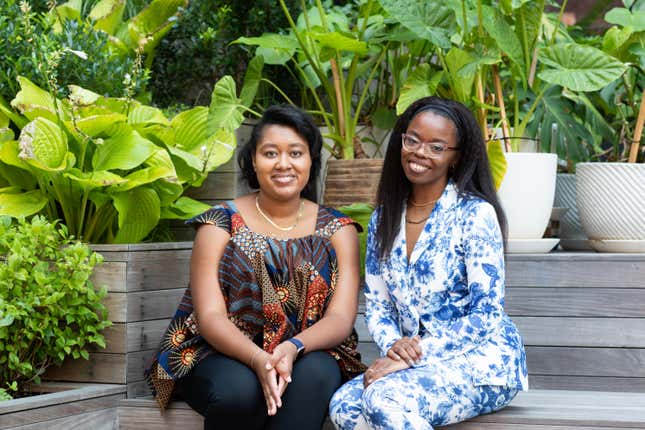
I’ve never found anything funny about science, that is, until my mind was blown by a science podcast hosted by two hilarious Black female scientists. Dope Labs is a podcast from Spotify Studios that breaks down scientific principles and serves them up with a healthy dose of tea.
Hosts Dr. Titi Shodiya, a materials scientist and engineer, and Dr. Zakiya Whatley, a molecular biologist, met in graduate school at Duke University. The two have been friends for over a decade, something that comes through in every episode. You’ll find yourself laughing out loud as you feel like you’re eavesdropping on a girl’s night out. The Root spoke with Dr. Titi Shodiya about the inspiration for the podcast and why she and her co-host believe “science is for errybody.”
A Safe Space For Questions
Dr. Shodiya says she and Dr. Whatley have always loved science and math, but they know not everyone shares their passion for numbers and formulas. So they developed their podcast as a safe space for people to get their questions answered. “Science isn’t just for folks who are interested in it. We’re all interacting with science constantly. We wanted people to feel like they could ask questions without feeling dumb,” she said.
With every episode of Dope Labs, the hosts look at scientific concepts through the lens of the topics that have people talking. A hilarious two-part episode about maternal health was inspired by Rihanna’s pregnancy. “We got to talk about Rihanna because we were excited when the pictures dropped. But we also wanted to cover the things people need to know about the maternal health system,” she said.
Dr. Shodiya says one of her favorite past episodes dealt with the issue of science denial around the COVID-19 vaccine. “We saw throughout the pandemic that people were being ‘otherized’ because they had questions and didn’t understand the process of vaccines,” she said. “It created this really negative space where folks didn’t even feel like they could ask for more information about the medicine they were being told to take.” But rather than point fingers at people who were hesitant about the vaccine, Dr. Shodiya says she and her co-host chose to use their platform to provide a forum for people to learn and be heard. “It actually makes sense to be skeptical if you come from a marginalized community where there has been a lot of mistrust in medicine. [The skepticism] is well-founded, but we wanted to give people the tools to make an informed decision.”
Although she knows they won’t be able to change everyone’s mind, Dr. Shodiya says she has a special place in her heart for those who want information but don’t know where to look. “Those are the ones I want to tell, ‘Hey, let’s hold on to each other. I’m going to try to help you with this. Ask your questions, and let’s look for facts.”
Mental Health Matters
Mental health and its impact on the Black community is another important topic to the Dope Lab hosts, who have dedicated several episodes to the issue. In a recent episode entitled “Healing Through Art Therapy,” the hosts spoke with Juliet King, an Associate Professor of Art Therapy at George Washington University about how art can help us process trauma and heal.
Dr. Shodiya believes that as Black voices, Dope Labs has a responsibility to let their audience know that they are not alone. “Lots of times, folks don’t know that other people are struggling. With social media, it can look like everybody else is having a good time,” she said. “But all of us have the potential to have these struggles at some point in our lives.”
Dr. Shodiya says the reaction to Dope Labs has been overwhelmingly positive. “When we first started making the show, I thought maybe ten people would listen, including our family and closest friends. But it’s always really shocking to learn how many people actually listen to the show.” The hosts love hearing that their show has won over people who don’t like science or don’t typically listen to podcasts. “That’s exactly what we hoped for. We didn’t just want people to learn things. We wanted to build a community rooted in friendship,” she said.
More than anything, Dr. Shodiya says she hopes that listening to Dope Labs will give their listeners a place where they feel seen. “That’s always our north star. We want to reach people who are left out of the science conversation.”

